European financial supervision will happen after all
Ralitsa Kovacheva, September 8, 2010
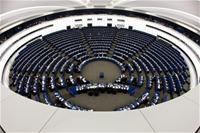 After the "Madrid compromise" on the European diplomatic service, the European "trinity" (the Commission, the Parliament and the Council) have reached a new major breakthrough - on financial supervision. The topic is on the agenda for more than a year, but differences in the positions of the three parties have delayed the adoption of adequate legislation. As on other major issues, the problem was in Parliament's aspiration for more power of the pan-european supervisors over the national ones, on the other hand - there is the resistance of the Council (Member States) to the intervention in the management of the financial sector at a national level and in the middle - there are the compromise proposals of the Commission which haven't satisfied neither of the two sides.
After the "Madrid compromise" on the European diplomatic service, the European "trinity" (the Commission, the Parliament and the Council) have reached a new major breakthrough - on financial supervision. The topic is on the agenda for more than a year, but differences in the positions of the three parties have delayed the adoption of adequate legislation. As on other major issues, the problem was in Parliament's aspiration for more power of the pan-european supervisors over the national ones, on the other hand - there is the resistance of the Council (Member States) to the intervention in the management of the financial sector at a national level and in the middle - there are the compromise proposals of the Commission which haven't satisfied neither of the two sides.
Now, however, the path to the establishment of the European Board for Systemic Risk (EBSR) and the European Supervisory Authorities (ESAs) is opened. Internal Market Commissioner Michel Barnier said that with the new architecture of financial supervision the EU will have “the control tower and the radar screens needed to identify risks, the tools to better control financial players and the means to act fast, in a co-ordinated way", the EUobserver wrote .
Risk (EBSR) and the European Supervisory Authorities (ESAs) is opened. Internal Market Commissioner Michel Barnier said that with the new architecture of financial supervision the EU will have “the control tower and the radar screens needed to identify risks, the tools to better control financial players and the means to act fast, in a co-ordinated way", the EUobserver wrote .
The European Voice cited Belgian Minister of Finance Didier Reynders as saying the agreement is "probably the most important decision" taken by the EU in response to the crisis. His satisfaction is understandable, because after a long deadlock in the negotiations on the issue, it was the Belgian EU Presidency that managed to secure the deal.
The new institutions
 The European Board for Systemic Risk (EBSR) will perform supervisory functions on macro level by developing a common set of indicators for risk assessment of specific cross-border financial institutions and on the basis of an analysis it will make early warnings and recommendations. Upon the insistence of the European Parliament, during the first five years the president of the European Central Bank will also be a president of EBSR, because the postition will also be given independence and moral authority and a clear identification of its responsibility to citizens.
The European Board for Systemic Risk (EBSR) will perform supervisory functions on macro level by developing a common set of indicators for risk assessment of specific cross-border financial institutions and on the basis of an analysis it will make early warnings and recommendations. Upon the insistence of the European Parliament, during the first five years the president of the European Central Bank will also be a president of EBSR, because the postition will also be given independence and moral authority and a clear identification of its responsibility to citizens.
While EBSR has more analytical functions, the European Supervisory Authorities (ESAs) were the real bone of contention. This mega authority comprises of three separate units for different types of financial institutions: a European Banking Authority (EBA), a European Insurance and Occupational Pensions Authority (EIOPA) and a European Securities and Markets Authority (ESMA)
The supervisors will have the power to impose their will over their national partners in three cases: when they violate EU law, when there is a dispute between national supervisors (in this case, ESAs will be entitled to impose legally binding mediation and enforce decisions of the institutions involved when compromise is not reached), to intervene as a mediator in its sole discretion (not only at the request of national surveillance) and upon a request by a Member State in a crisis situation. This is one of the points where the Council won against Parliament - only national governments to have the right to declare a crisis.
Parliament's position
MEPs are most satisfied, however, from gaining the right ESAs to be able to investigate certain financial institutions, financial products or activities, such as "toxic" products or naked short sellings. Supervisors may temporarily prohibit them and ask the Commission to propose legislation for a permanent ban.
"At the insistence of the Parliament, these authorities will now have real teeth.  Importantly, with the risks of speculation on financial markets ever present, a Green proposal to ensure the authorities can suspend trading of risky products in certain cases was accepted", said Sven Giegold, a German Green MEP, quoted by EurActiv .
Importantly, with the risks of speculation on financial markets ever present, a Green proposal to ensure the authorities can suspend trading of risky products in certain cases was accepted", said Sven Giegold, a German Green MEP, quoted by EurActiv .
Gigold however, expressed regret that the Council has insisted at all costs Member States to retain the right to declare a crisis and also regretted the Council's "illogical and inefficient proposal" the three supervisors to be scattered in three different cities. The European Banking Authority will be located in London, ESMA - in Paris, and EIOPA - in Frankfurt.
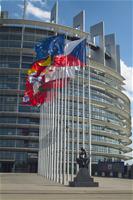 In a press release, the European Parliament stresses that the institution has won a “democratic oversight of the whole supervisory system. The European Parliament will be able to veto the appointment of ESA chairpersons and will have a say in the development of the technical standards and implementing measures. Moreover, the ESRB President will keep the chair and vice-chairs of the EP's Economic Affairs Committee updated on ESRB activities through confidential discussions.”
In a press release, the European Parliament stresses that the institution has won a “democratic oversight of the whole supervisory system. The European Parliament will be able to veto the appointment of ESA chairpersons and will have a say in the development of the technical standards and implementing measures. Moreover, the ESRB President will keep the chair and vice-chairs of the EP's Economic Affairs Committee updated on ESRB activities through confidential discussions.”
Despite the current opposition from the Council, four major political groups in the EP issued a common declaration, saying that “through future legislation, additional supervisory powers shall be conferred on the European Supervisory Authorities” in terms of entities with EU-wide reach such as trade depositories and central counter parties.
What's Next
The agreement received the final support from ECOFIN and in the end of the month  changes will be voted by Parliament so that it could enter into force on January 1, 2011. The establishment of these new institutions is a precondition for the adoption of other legislative initiatives with respect to the financial sector: Commission's proposal on Bank Resolution Funds, the imposition of bank levies and eventually - a financial transactions tax, which may be the first euro tax in EU's history.
changes will be voted by Parliament so that it could enter into force on January 1, 2011. The establishment of these new institutions is a precondition for the adoption of other legislative initiatives with respect to the financial sector: Commission's proposal on Bank Resolution Funds, the imposition of bank levies and eventually - a financial transactions tax, which may be the first euro tax in EU's history.
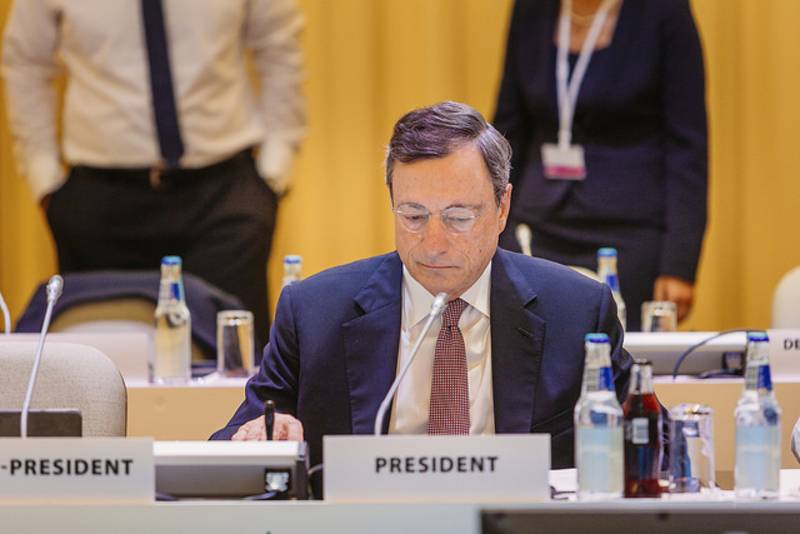 Mario Draghi | © ECB
Mario Draghi | © ECB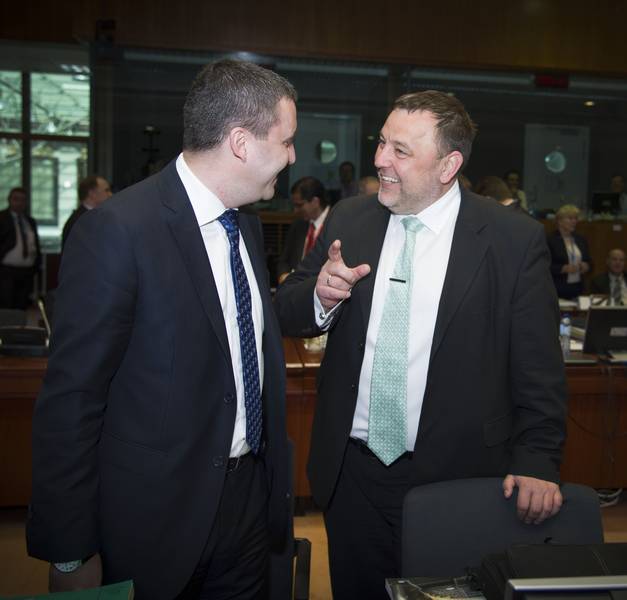 Vladislav Goranov, Sven Sester | © Council of the EU
Vladislav Goranov, Sven Sester | © Council of the EU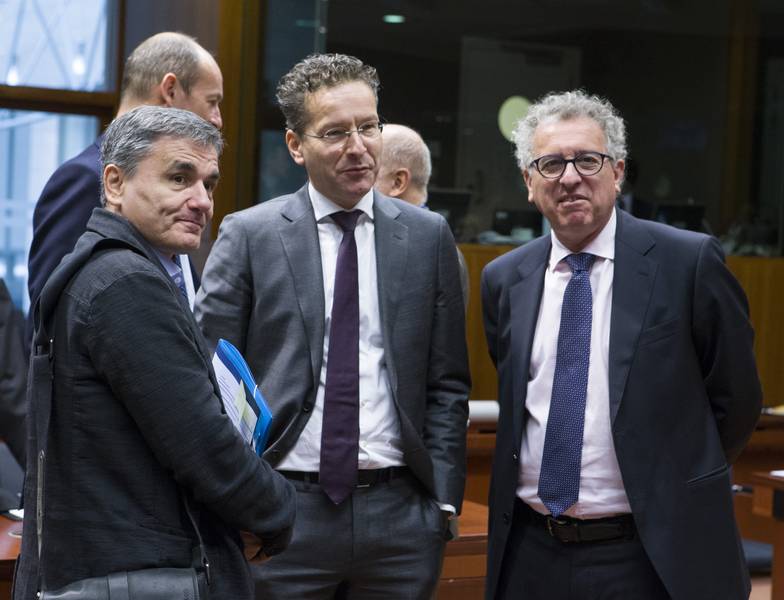 Tsakalotos, Djisselbloem, Gramegna | © Council of the EU
Tsakalotos, Djisselbloem, Gramegna | © Council of the EU